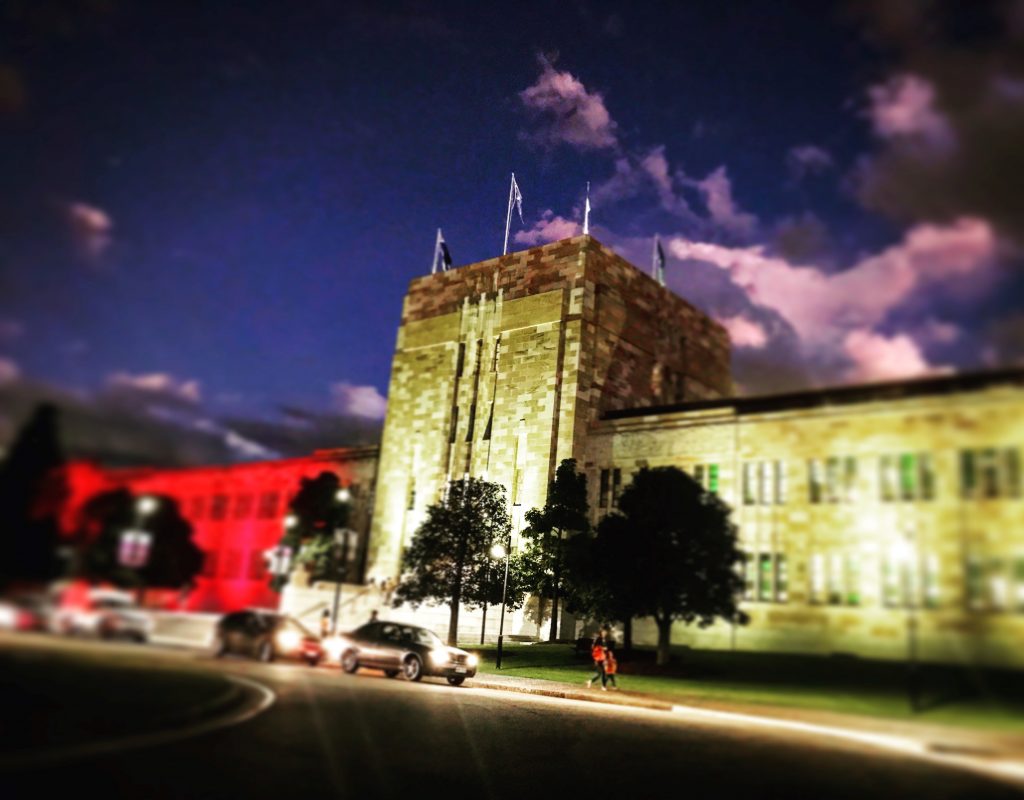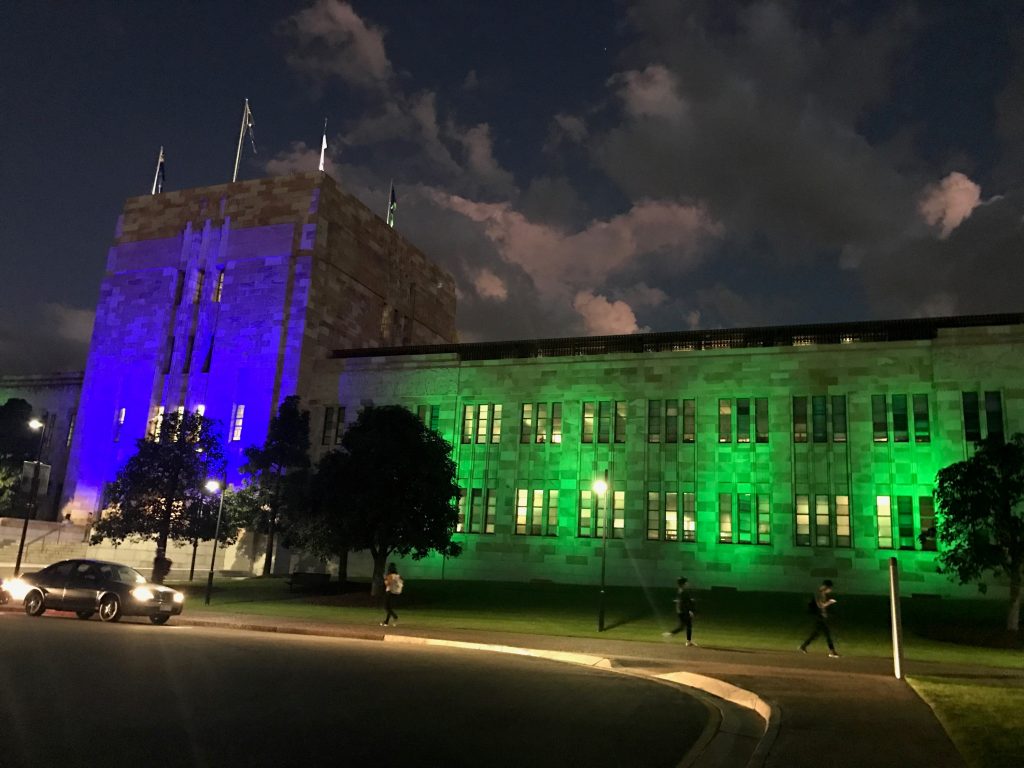Significant Dates and Events

Many of us did not learn at school about Aboriginal and Torres Strait Islander significant dates, and in fact, many of the dates that are important to Aboriginal and Torres Strait Islander communities (and some non-Indigenous communities) are still not recognised nationally. You may not hear about them like you do for significant British or Commonwealth dates such as royal dates, or dates of invasion. It takes some commitment from all of us to establish dates significant to Aboriginal and Torres Strait Islander peoples as important days on everyone’s calendar, and to show our support and celebrate as we stand with, where appropriate, Aboriginal and Torres Strait Islander people on these days on significance.
Below we have listed dates of significance at the UQ, as the lands where you study, live, work and play, as well as national dates of significance.
Significant Dates at UQ St Lucia – 1960s/1970s
The St Lucia campus became a political hotbed during the reign of Queensland Premier Joh Bjelke-Peterson from 1968 to 1987. For many people, Queensland became a very unsafe space during his time in power. Stories of people being detained without reason, and of intimidation, harassment and police brutality were rife in this period, especially if you were an Aboriginal or Torres Strait Islander person.
Although Joh Bjelke-Peterson’s Country/National Party government tried to limit marches and protests by imposing strict rules for permits, student groups and associations such as the Vietnam Action Committee and the leaders of the Civil Liberties March at UQ successfully managed to hold large gatherings at the UQ Student Union Complex and its Forum area. (Marnane and Bower 2021)
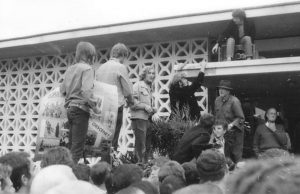
Aboriginal activists were central to this protest movement. After these activities, Aboriginal and Torres Strait Islander and non-Indigenous student activists united in a large gathering at the UQ Student Union Complex, where the late Wangerriburra/ Birri Gubba activist Sam Watson (1952 – 2019) gave his first public speech in 1971. Watson later stood as a Socialist Alliance candidate, worked in Aboriginal legal rights, and became a deputy director of the Aboriginal and Torres Strait Islander Studies Unit at UQ in 2009.
These large gatherings marched from the St Lucia campus along Coronation Drive to Roma Street Forum in the city on many occasions. Along with the anti-war demonstrations, such as the Vietnam War Moratorium march in 1970, racial justice activities and resistance to racism became an inseparable part of the history of the UQ Student Union Complex. Several key events highlight the significance of the UQ Student Union Complex in this regard.
In 1971, the site was used to organise a large protest against the apartheid regime in South Africa. The protest was ignited by the arrival in Brisbane of the Springboks, the South African rugby union team, on the first leg of their tour of Australia. Prior to the Springboks’ arrival, a state of emergency had been declared by the Queensland State government in anticipation of protests. Within a couple of days, the protest resulted in a university-wide strike and more widespread national action against apartheid in South Africa (Queensland Police 2017; Garnham 2021)
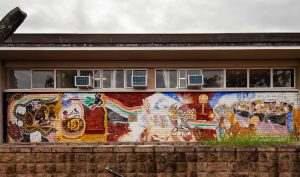
A critical visual reference signalling the presence of Aboriginal staff and students at the university, and a reflection of their history of place and resistance at UQ, is a mural created by Aboriginal students at the site (above). The mural depicts imagery of traditional Aboriginal culture, select national events and other themes of survival, resilience and protest. The mural was painted by Aboriginal artists June Breen, Michelle Barney and Joe Hurst in the lead-up to the official celebrations accompanying the 1988 Australian Bicentenary, a milestone that triggered a national debate about Aboriginal and Torres Strait Islander rights and national identity.
Launched by Garumgah / Dungibara artist Vanessa Fisher, the mural was defaced by racist graffiti in the form of a white-painted ‘KKK’ symbol across the Aboriginal flag on the mural’s right side (Go-Sam, Greenop, Marnane and Bower 2021). The artists cleverly captured the confrontational vandalism for posterity, cover up the offending symbol, but they left a barely discernible trace of the KKK reference and added an AK47 complete with ammunition belt in the bottom right corner(Go-Sam, Greenop, Marnane and Bower 2021).
In 2003, the mural was endorsed by the late Aboriginal Elder Sam Watson (below), who reinforced the significant historical values of mutual respect and equality symbolised in the artwork. The mural has been visually obscured by a masonry stairwell and garden bed in subsequent upgrades to the UQ Student Union Complex.
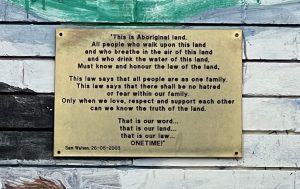
Other significant dates at UQ
| Year | Significance of the year |
|---|---|
| 1944 | Joe Croft, first Aboriginal student to enrol at UQ |
| 1950 | Willie McKenzie and Janey Sunflower (nee Morton) are the first Aboriginal advisors to work at UQ |
| 1966 | Dr Margaret Valadian (MBE, AO) becomes the first Aboriginal person to graduate with a full Bachelors degree at UQ |
| 1973 | Australian Journal of Indigenous Education is first published |
| 1979 | Dr Lilla Watson is appointed as UQ’s first Aboriginal tutor, and then as a lecturer in the Department of Social Work in 1984 |
| 1984 | UQ establishes the Aboriginal and Islander Studies Unit (now Aboriginal and Torres Strait Islander Studies Unit) and Murri Hour, Queensland’s first Indigenous radio show, begins on 4ZZZ, broadcasting from UQ’s St Lucia campus, featuring singer/ songwriter Kev Carmody |
| 1985 | UQ appoints Jeanie Bell as the first coordinator of the Aboriginal and Islander Studies Unit (now Aboriginal and Torres Strait Islander Studies Unit) |
| 2002 | Dr Lilla Watson is appointed as the first Aboriginal UQ Senate member |
| 2010 | Dr Noritta Morseu-Diop is UQ’s first Torres Strait Islander PhD to graduate |
| 2011 | Professor Cindy Shannon is appointed as UQ’s first Pro-Vice-Chancellor (Indigenous Engagement) |
| 2015 | UQ’s Poche Centre for Indigenous Health is established |
| 2018 | UQ’s first Innovate Reconciliation Action Plan is launched and UQ holds the inaugural UQ NAIDOC Festival (Week 2, Semester 2 annually) |
| 2022 | UQ opens Kev Carmody House, student residential accommodation, and offers Kev Carmody Scholarships to support Aboriginal and Torres Strait Islander students experiencing financial hardship with the cost of residential fees at the Kev Carmody House |
National Days of Significance
| Date | Significance |
|---|---|
| 26 January |
Survival Day / Invasion DayFor some Australians, particularly Aboriginal and Torres Strait Islander peoples, January 26 is not a day of celebration, but is seen as a day which commemorates the invasion by British settlers of lands already owned. For many Aboriginal and Torres Strait Islander people, Australia Day is also an opportunity to recognise the survival of our people and our culture. Despite colonisation, discrimination, and comprehensive inequalities, we continue to practise our traditions, look after the land, and make our voices heard in the public sphere. We survive. Things to do: Hold a BBQ, join a street march, post on social media, learn about the significance by watching films and documentaries, reading books and listening to podcasts. Let’s Talk… January 26 from Reconciliation Australia has more information. |
| 13 February |
Anniversary of National Apology DayOn 13 February 2008, then Prime Minister Kevin Rudd delivered the National Apology to Australia’s Aboriginal and Torres Strait Islander peoples for the injustices of past government policies, particularly with regard to the Stolen Generations. The day is important to recognise. Things to do: Read about the history, celebrate distinguished Aboriginal and Torres Strait Islander peoples, speak up against discriminatory laws, watch the Apology and go to or hold a group discussion. The Healing Foundation has more information. |
| Third Thursday of March |
National Close the Gap DayNational Close the Gap Day is an annual event that raises awareness and seeks to close the gap with respect to life expectancy, child mortality, educational and employment outcomes between Aboriginal peoples and Torres Strait Islander peoples, and non-Indigenous Australians. Things to do: Start your own activity in your workplace (host a talk or screening with staff), sign the pledge and or host an event to encourage colleagues and find out more about National Close the Gap Day. |
| 21 March |
International Day for the Elimination of Racial DiscriminationThe United Nations International Day for the Elimination of Racial Discrimination is observed annually on the day the police in Sharpeville, South Africa, opened fire and killed 69 people at a peaceful demonstration against apartheid “pass laws” in 1960. In 1979, the General Assembly adopted a programme of activities to be undertaken during the second half of the Decade for Action to Combat Racism and Racial Discrimination. On that occasion, the General Assembly decided that a week of solidarity with the peoples struggling against racism and racial discrimination, beginning on 21 March, would be organised annually internationally. Things to do: Show your support for anti-racism campaigns such as Racism. It Stops with Me or #fight racism. |
| 26 May |
National Sorry DayNational Sorry Day provides an opportunity for people to come together and share the journey towards healing for the Stolen Generations, their families, and communities. Things to do: Post messages of support on social media, attend a Link Up or commemorative event, form the word “sorry” with colleagues, friends, family and community (see below) and find out more from The Healing Foundation. |
| 26 May |
Anniversary of the Uluru Statement from the Heart being given to the Australian People“The Uluru Statement from the Heart is an invitation to the Australian people. We ask Australians to accept our invitation to walk with us in a movement of the Australian people for a better future. We call for the establishment of a First Nations Voice enshrined in the Constitution and a Makarrata Commission to supervise a process of agreement-making and truth-telling about our history.” (First Nations Constitutional Convention 2017) The Convention first issued the Statement to the Australian people on 26 May 2017. Things to do: Read the Uluru Statement at a team or staff meeting, hold a panel discussion about what the calls to action mean in the context of your workplace, watch a webinar and write a letter to your Minister of Parliament. Find out more at From the Heart. |
| 27 May |
1967 ReferendumThe 1967 Referendum was a landmark achievement following decades of activism by Aboriginal and Torres Strait Islander and non-Indigenous people, where more than 90 percent of Australians voted in favour of amending two sections of the Australian Constitution. Things to do: During your lunch break find out more about the 1967 Referendum and look on the Reconciliation Australia website for events in your area. |
| 27 May – 3 June |
National Reconciliation WeekNational Reconciliation Week celebrations commemorate two significant milestones in the reconciliation journey: the anniversaries of the successful 1967 Referendum and the High Court Mabo Decision. Things to do: Check out the theme, resources and actions to take at National Reconciliation Week. Download social tiles and banners from the NRW website and share amongst you friends and family. |
| 29 May |
Torres Strait Islander flag first flownThe flag was officially presented to the people of the Torres Strait at the sixth Torres Strait Cultural Festival on 29 May, 1992. The following month, the flag was recognised by the former national body, the Aboriginal and Torres Strait Islander Commission and given equal prominence with the Aboriginal flag. (Australian Institute of Aboriginal and Torres Strait Islander Studies) Things to do: Take some time out to learn about the Torres Strait Islander flag and culture and attend or organise a flag raising ceremony in your area. Find out more from the Torres Strait Island Regional Council. |
| 3 June |
Mabo DayOn June 3, 1992, the High Court of Australia overturned the principle of ‘terra nullius’ or ‘nobody’s land’ as claimed by the British when they first arrived in this country. The decision has paved the way for Native Title legislation. Things to do: Reflect upon Eddie Mabo’s legacy and steps to contribute to reconciliation in Australia. Attend or organise a panel discussion on Native title, treaty or sovereignty. |
| 1 July |
Coming of the LightThe Coming of the Light is celebrated annually by Torres Strait Islander peoples. It marks the adoption of Christianity through island communities during the late nineteenth century. Things to do: Take some time in the day to listen, read or watch a Torres Strait Islander person or group talk about culture. Find out more from the Torres Strait Island Regional Council. |
| First Sunday to Sunday week of July |
NAIDOC WeekEach year, NAIDOC Week celebrations highlight the rich and diverse cultures of Aboriginal peoples and Torres Strait Islander peoples, the First Australians. NAIDOC Week celebrations and community events are a great opportunity for everyone to come together and acknowledge the history, culture, and achievements of Aboriginal and Torres Strait Islander people. Things to do: Check out the theme, resources and activities at National NAIDOC Week. Download and print a poster to raise awareness and start conversations. |
| 9 July |
Aboriginal flag first flownThe flag was first raised on 9 July in 1971 at a land rights rally in Victoria Square/Tarntanyangga, Adelaide, on then-National Aborigines Day. (Australian Institute of Aboriginal and Torres Strait Islander Studies) Things to do: Take some time out to learn about the Aboriginal flag and cultures and attend or organise a flag raising ceremony in your area. |
| 14 July |
Aboriginal and Torres Strait Islander flags recognised as Flags of AustraliaOn 14 July 1995, the Governor General of Australia William Hayden proclaimed both the Aboriginal Flag and the Torres Strait Islander Flag to be ‘Flags of Australia’ under the Flags Act 1953. (Australian Institute of Aboriginal and Torres Strait Islander Studies) |
| 4 August |
National Aboriginal and Torres Strait Islander Children’s DayNational Aboriginal and Torres Strait Islander Children’s Day is an opportunity for all Australians to learn about the crucial impact that community, culture, and family play in the life of every Aboriginal and Torres Strait Islander child. Things to do: Find out more and things you can do for Children’s Day. |
| 9 August |
International Day of the World’s Indigenous PeoplesThe day was proclaimed by the United Nations in 1994 to promote the protection and rights of Indigenous peoples and to celebrate Indigenous peoples’ cultures and achievements all around the world. Read the United Nations’ Declaration on the Rights of Indigenous Peoples (PDF, 150KB), for more information. Things to do: Check out the theme, resources and activities at United Nations. |
| First Wednesday of September |
Indigenous Literacy DayIndigenous Literacy Day is a national celebration of Indigenous culture, stories, language, and literacy. Through activities on the day, we focus our attention on the disadvantages experienced in remote communities and encourage the rest of Australia to raise funds and advocate for more equal access to literacy resources for remote communities. More information at the Indigenous Literacy Foundation. Things to do: Attend or organise a Great Book Swap where people swap a book for a donation to the Indigenous Literacy Foundation. |
| 13 September |
Anniversary of the UN Declaration on the Rights of Indigenous PeopleThe 13 of September marks the anniversary of the adoption by the United Nations of the Declaration on the Rights of Indigenous Peoples from 2007, which affirms the minimum standards for the survival, dignity, security, and well-being of Indigenous peoples worldwide and enshrines Indigenous peoples’ right to be different. Australia signed up to the Declaration in 2009. Things to do: Take a break and read the Declaration. You can also post on social media about the Article that resonates most with you. |
